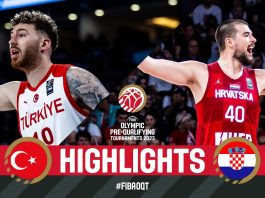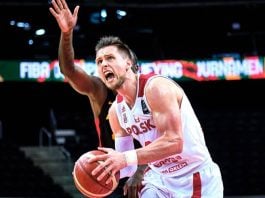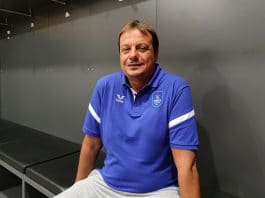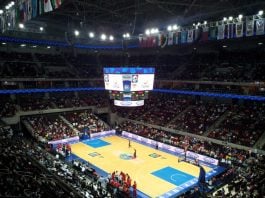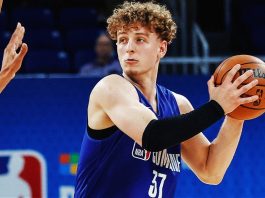 Tonight we picked up where we had left the previews yesterday, namely the projected teams of 9-12. While we feel that all the teams below are good enough to make the second group stage, they will have to put up an extraordinary performance to make the playoffs.
Tonight we picked up where we had left the previews yesterday, namely the projected teams of 9-12. While we feel that all the teams below are good enough to make the second group stage, they will have to put up an extraordinary performance to make the playoffs.
9. MONTENEGRO
A huge disappointment two summers ago in Lithuania might well be a thing of the past, especially after an amazing qualification summer in 2012. The contradiction is – of course – obvious. In 2011, in their first participation at a Eurobasket and led by their biggest star, Nikola Pekovic and a stunning frontcourt, the Montenegro team didn’t manage to get out of the group stage. One year later, without Pekovic or their other NBA player, Nikola Vucevic, they beat Serbia twice in the qualification stage and, while playing in the toughest group, they won all their games to complete the most amazing run and raise the bar much higher for this Slovenia-based European Championships.
Led by a combo of Vladimir Dasic and Bojan Dubljevic at forwards, the team was even discussed for a potent medal contender earlier this summer, when it was made known that several stars (Pau Gasol, Juan Carlos Navarro, Joakim Noah, Nick Calathes, among others) would be skipping the Eurobasket, while Pekovic was still in for the tournament.
The bad news, however came just after that. Pekovic, on the verge of signing a multi-year deal with Minnesota. Vucevic, the NBA’s second best rebounder, has yet to perform at a high level under the international-game rules. In several friendlies, he is not starting and thus Dasic is moving to power forward with Dubljevic playing center. Dubljevic, coming off a stunning year in Spain with Valencia can play both frontline positions, while he is more productive at four, while Dasic – now the team’s leader with Pekovic absent, but following a problematic season club-wise – can play both 3 and 4 but he is far tougher to guard when playing small forward. Milko Bjelica and Blagota Sekulic will definitely see minutes in the games, especially if coach Luka Pavicevic wants to see Dasic play small forward at stretches. The last man in the frontcourt could be Filip Barovic and this is because of Marko Todorovic’s injury.
The backcourt, always a worry for Montenegro, doesn’t look all that different this summer. After, originally, Tyrese Rice is going to play for them and run the point, this time instead of Taylor Rochestie. Tthe Maccabi guard is smart and good and had a very good season in Munich.. He will be backed up by ex-wunderkid Nikola Ivanovic, who now at 19 years of age, already possesses the experience of a veteran but hasn’t developed much since his U16 Eurobasket stand out performances.
At the wings, if the team doesn’t go big with Dasic at SF, Pavicevic has several finishers and shooters, but not a single real scorer, an advantage that could be getting Montenegro out of the mid-tier teams and put them directly to the elite, even without Pekovic. Suad and Sead Sehovic, veteran Bojan Bakic and Aleksa Popovic will again share the minutes at SG and SF.
Overall, a pretty unstable team and with the potential of underachieving again, especially when their group is so tough to get out of (Lithuania, Serbia, Macedonia, Bosnia and Herzegovina, Latvia).
10. CROATIA
The Croatian national team started participating in Eurobaskets in 1993. It was the summer where Serbia was not allowed to play and the Croats were supposed to win it all, but the devastation following Drazen Petrovic’s tragic death just days before the tournament in Germany as well as a crazy run for the home team, cost the Croats that guaranteed gold medal. Since then it’s been 20 years and the Serbs have been back following further sentimental tourneys for the Croats. Serbia or Spain (namely in 2005 and that knock out overtime loss) being the reason, the always underachieving Croatian national team had several setbacks, desoite including stars like Toni Kukoc, Dino Radja or Nikola Vujcic.
And yet, the Croats always have talent. 12Deep once again in this Slovenia tournament, they can go far if they manage to get chemistry, But will they? The same team that can theoretically beat anyone, can also not qualify from the group stage or – again – collapse badly in a knock out game. Their lineup consists of a solid, but soft perimeter line and a rather decent frontcourt. The starting point guard is Roko Leni Ukic, backed up by Dontaye Draper. Certainly a nice combination of Euroleague level talent, court vision and slashing for Ukic, while Draper – if used the right way – can be very effective in transition and is a good scorer.
At off-guard and small forward their chemistry just collapsed after Marko Tomas’ sudden injury that will cost him his participation in Eurobasket (once again). While the swingman was their starting off-guard, they will now have to go this summer with the already starting bomber Bojan Bogdanovic, and possibly Krunoslav Simon, who is much more of a distributor, while off the bench along will come Ante Delas and Damjan Rudez. Simon has been effective as a glue guy for this team in the past and should be key in this tournament as well. The roles will now include Bogdanovic as the go-to perimeter player without any doubts and maybe even the 19-year old phenomenon Dario Saric will also play some minutes at SF, handling the ball at times and running some plays.
However, and after recovering from an earlier injury, Saric was recently starting as an off-the-ball power forward next to Ante Tomic who has been their starting center and offensive focal point in the paint. Saric is a very creative and skilled player for any level of competition but a blatantly non-existent defensive presence. Once he has the ball on his hands, good things are happening, especially if he isn’t the go-to player. But once off-the-ball, when the team cannot take advantage of his skills, the player might be a hole for Croatia. Tomic, quite possibly a top3 center in that tournament has yet to really prove himself at the international level. Backed up by stronger and more powerful Luka Zoric probably means that the coach started thinking about distributing minutes. We haven’t seen Zoric much at PF and Saric at SF as a consequence. The back up bigs are sweet-shooting Damir Markota and strong but unstable presences in Mario Delas and Luksa Andric. One of the last two might end up being cut, but for back ups, this is again a very strong combination of talent.
With Croatia playing in Spain’s group and also facing hosts Slovenia and potent overachievers Georgia, Czech Republic and Poland, it makes sense talent-wise that they belong to the 2nd round, but will they survive possible shocking results to avoid a meltdown this time?
11. ISRAEL
Notable absences for several teams of Israel’s caliber, a very thin group to get out of, which might allow them to carry a win to the second round, a very dedicated group of players always competing with the national team and their typical passion for overachieving and playing up to potential till the last moment are some of the reasons that Israel is ranked so high in this preview. It’s true that they also have a key absence in Gal Mekel, one more surprising NBA signing earlier this summer, but the main core of the team sticks around hoping for the best possible outcome. And their chemistry will be boosted by that, as it is usually boosted in such short tournaments where everything is relevant and the key factors to advance have less to do with talent and more with psychology.
The group that Israel will play at and will try to qualify from consists of France and then a bunch of beatable teams for Israel. Germany, Belgium, Ukraine and Great Britain. While the Brits will most likely finish last and the French are much better than Israel, the rest are more or less at the same level. None of those teams possesses a better starting lineup than the Israeli team though and maybe all of them have a similar amount of notably good players coming off the bench. For that slight advantage that Israel has, it’s considered more likely that they can finish second in Group A.
Their players look rather familiar to Euroleague viewers. Yogev Ohayon, one of Europe’s finest true PGs will be the boss of the perimeter. Great passer and a good decision maker will spend a lot of time on the floor, backed up by Afik Nissim for short stretches. Hotam Halperin, one of the oldest members of the squad by now is going to take care of scoring and shooting. Two more veterans will accompany him in the wings in Guy Pnini and Raviv Limonad, both good shooters and with high experience in playing specific roles both sides of the floor.
The forward positions, however, is where Israel is possessing their true advantage with Omri Casspi and Lior Eliyahu playing full time at 3 and 4, although both of them can play in shorter lineups, with Casspi playing power forward and Eliyahu as a soft center. Being offensively creative and with good scoring insincts, they can both use their size to take advantage of opponents’ frontline limitations in their group. The presence of a decently experienced frontcourt combination in Yaniv Green (naturally starting at center), Alex Tyus, Ido Kozikaro and Elishay Kadir gives space to the two really talented forwards to play as much as they should do, as well as the necessary amount of role players to take care of the dirty job, that is fouling, defending and rebounding.
Whether or not Israel will qualify from Group A and then stand a chance to go further in the competition, it will depend on several results, but the truth is that they have just slightly more chances to do so than their opponents in the opening round.
12. POLAND
Similarly to Israel, but with a much more difficult group to qualify from, we will risk by ranking Poland at number 12 in this preview. While the obvious choice here should be a team from Greece’s group (meaning Russia or Italy), these teams have looked rather unstable and problematic, while they are battling many key absences to be reliable quality-wise. And although the Polish may not make it as far as the second round, given that to do so, they have to beat Croatia or Slovenia, at least, they are more decent and reliable, have better chemistry and a much more balanced roster, even if they aren’t the most talented team around.
What does Poland possess though? First of all, a good and reliable coach in the experienced German Dirk Bauermann. If you hire Bauermann, you know that you won’t end up creating any spectacular team, but you won’t underachieve either. Secondly, a solid roster. Starting with the backcourt, the Poles have a pass-first point guard in Lukasz Koszarek. The 29year old playmaker is a good passer, a sober presence in the perimeter and an ok shooter and scorer when needed. His back ups are big sized Michal Chylinski and the undersized Krzysztof Szubarga. The very experienced role player Thomas Kelati along with Mateusz Ponitka, one of the most skilled 20-year olds in Europe, are starting in the wings. While Kelati is a common name for Euroleague and Eurocup viewers, Ponitka just came off from a very good rookie EL season and is now a thrilling addition to that team. Przemyslaw Zamojski and Adam Waczynski are both good shooters and will be coming off the bench for the starting wings.
In the frontcourt, here come the two main names of that team. Starting with Macej Lampe, one of Europe’s elite big men, able to play equally well at both frontcourt positions. He is a good shooter, likes the perimeter, is tough to guard due to his size and rebounds well. Lampe is fresh from signing with Barcelona after a fine season in Vitoria and Kutxa Laboral. He will be spending time either starting at power forward or backing up Marcin Gortat at center. More than just a good finisher and elite rebounder, Gortat has established himself as one of the best centers in the business, with the ability of beasting opponents at moments thanks to his good athleticism, length and defensive ability. He will also be a huge factor for any potential success of the Poles.
Finally, a key inside-outside power forward, Michal Ignerski, is enjoying the advantage of good shooting, either if playing next to Lampe or Gortat. Another 20-year old and member of their 1993-born generation, Gonzaga’s Przemek Karnowski is finally getting his chance at the senior level and is expected to play well in limited minutes. Finally veteran Adam Hrycaniuk is the last part of a seriously talented frontcourt.
Getting out of Spain’s group against the champs, the hosts and Croatia is not an easy task, especially if Georgia and Czech Republic are the last two teams, which you also need to beat. But the Poles haven’t been better than today for some years and they might have a chance to actually make it through.
All the previews were written by TalkBasket’s UK based associate Dimitris Ritsonis. You can follow him, as well as send any feedback to him on twitter @wardjdim

